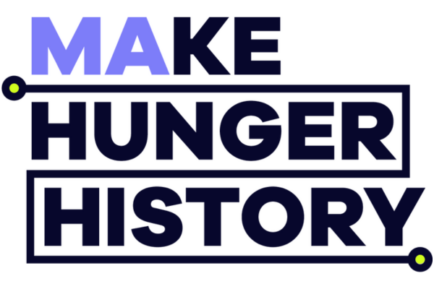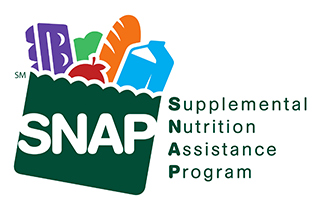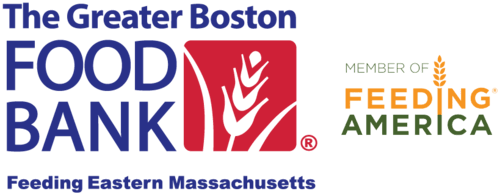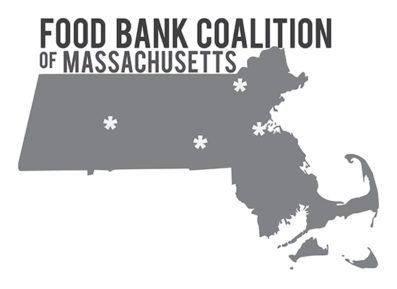Coalitions and Partnerships
1. Food Bank Coalition of Massachusetts
The Food Bank Coalition of Massachusetts (FBCMA) is comprised of the four regional food banks across the Commonwealth: The Food Bank of Western Massachusetts (FBWMA), The Greater Boston Food Bank (GBFB), the Merrimack Valley Food Bank (MVFB), and the Worcester County Food Bank (WCFB). The coalition advocates on behalf the regional food banks and its nearly 1,000 partner agencies made up of pantries, meal program, shelters, and mobile markets. Most notably, the FBCMA advocates for the Massachusetts Emergency Food Assistance Program (MEFAP), which is the state funding program administered by the Massachusetts Department of Agriculture (MDAR) that allows the food banks to provide the basics of a healthy, balanced diet to families in need across the Commonwealth.
2. Make Hunger History
 GBFB and hunger-relief stakeholders across the state are joined in a shared commitment to ending hunger through the Make Hunger History coalition. The coalition is dedicated to crafting and implementing a comprehensive statewide plan to eliminate hunger in Massachusetts once and for all.
GBFB and hunger-relief stakeholders across the state are joined in a shared commitment to ending hunger through the Make Hunger History coalition. The coalition is dedicated to crafting and implementing a comprehensive statewide plan to eliminate hunger in Massachusetts once and for all.
3. MA SNAP Coalition
The Massachusetts SNAP Coalition is led by the Massachusetts Law Reform Institute (MLRI) and includes various anti-hunger agencies, health care and homelessness providers, faith-based organizations, community action programs, and legal services advocates. Representatives from state agencies, such as the Massachusetts Department of Transitional Assistance (DTA) and the Massachusetts Department of Public Health (DPH), regularly attend as well. The coalition focuses on advocacy and administration of the Supplemental Nutrition Assistance Program (SNAP), the Special Supplemental Nutrition Program for Women, Infants, and Children (WIC), child nutrition, and other anti-hunger programs at both the state and federal level.
4. Hunger-Free Campus Coalition
The Hunger-Free Campus Coalition, a statewide coalition co-led by The Greater Boston Food Bank (GBFB), The Food Bank of Western Massachusetts (FBWMA), Massachusetts Law Reform Institute (MLRI), and Central West Justice Center, includes more than 40 anti-hunger and student advocate organizations and college staff who deal directly with students facing basic needs insecurity. The coalition was formed in the fall of 2019 to address food insecurity among high-need populations enrolled in Massachusetts public colleges and universities. The coalition is currently working on a bill filed during the 2021-2022 session (HD 2969 and SD 1477) that would provide capacity, guidance, and funding to allow 2- and 4-year public colleges and not-for profit institutions of higher education that serve a significant proportion of low-income students to take several steps in alleviating food insecurity on campus.
5. Feed Kids Coalition
The Greater Boston Food Bank (GBFB) is a partner within Project Bread’s Feed Kids Coalition, which aims to provide access to school meals for all children in Massachusetts. The coalition is currently working on a bill filed during the 2021-2022 session (HD 1161 and SD 519) that would ensure every meal served through the National School Lunch Program or School Breakfast Program would be free for any student who wants or needs it by utilizing existing federal provisions such as the Community Eligibility Provision (CEP). The bill would also increase school outreach for the Supplemental Nutrition Assistance Program (SNAP), as every household on SNAP increases the federal reimbursement for school meals. To learn more, check out the coalition’s Frequently Asked Questions page.
6. SNAP Gap Coalition
The Greater Boston Food Bank (GBFB) is a partner within a coalition led by the Massachusetts Law Reform Institute (MLRI) and National Association of Social Workers Massachusetts Chapter (NASWMA) that is pushing to close the “SNAP Gap,” which is the number of individuals that receive MassHealth and are likely eligible for but do not receive Supplemental Nutrition Assistance Program (SNAP) benefits. The coalition is also pushing to close the “Family Income Gap,” which is the number of families with minor children who receive SNAP benefits but have zero earned or unearned income. The coalition is currently working on a bill filed during the 2021-2022 session (HD 1500 and SD 1015) that would permanently allow individuals to apply for MassHealth and SNAP simultaneously, allow individuals to apply for SNAP and Department of Transitional Assistance (DTA) cash benefits simultaneously, and lay the foundation for a common application for other needs-based programs.
7. Lift Our Kids Coalition
Lift Our Kids is a coalition of nearly 150 Massachusetts organizations dedicated to improving policies that harm the Commonwealth’s lowest income children. During the 2019-2020 state legislative session, they ran a successful campaign to increase both the Transitional Aid to Families with Dependent Children (TAFDC) benefit and the Emergency Assistance to Elderly, Disabled and Children (EAEDC) by 10%. The coalition is currently working on a bill filed during the 2021-2022 session (HD 1158 and SD 430) that would raise the TAFDC and EAEDC grants by 20% a year until the maximum grant reaches half of the federal poverty level.
8. MPHA Task Force on Coronavirus and Equity
The COVID-19 outbreak is not impacting Massachusetts residents equally. Communities that are already facing marginalization are being hardest hit by the virus and its economic repercussions, starkly exposing inequities across Massachusetts and the nation. The people most impacted include Black and Latinx residents, low-wage workers, immigrants, non-English speakers, people who are housing insecure or experiencing homelessness, people living in nursing homes, people with disabilities, people who are food insecure, and people who are incarcerated.
To advocate for equity in the state’s response to this crisis and rapidly develop policy recommendations, in March of 2020, the Massachusetts Public Health Association (MPHA) convened a Task Force on Coronavirus & Equity, made up of more than 100 public health, health care, civil rights, immigrant justice, social service, and community organizations.

